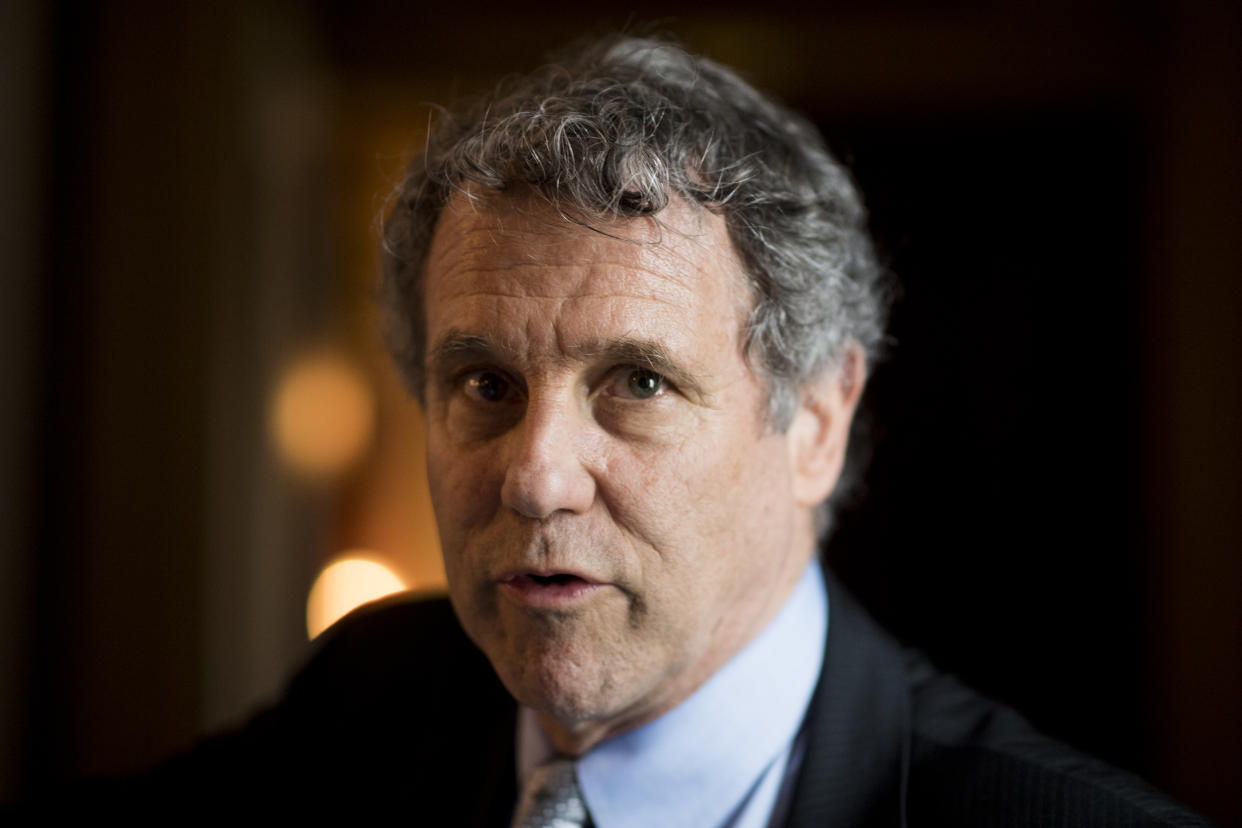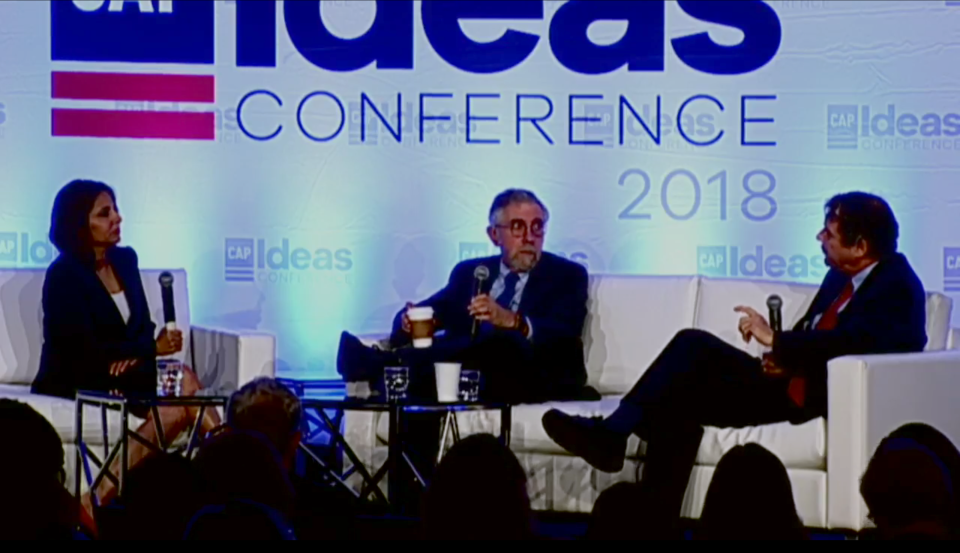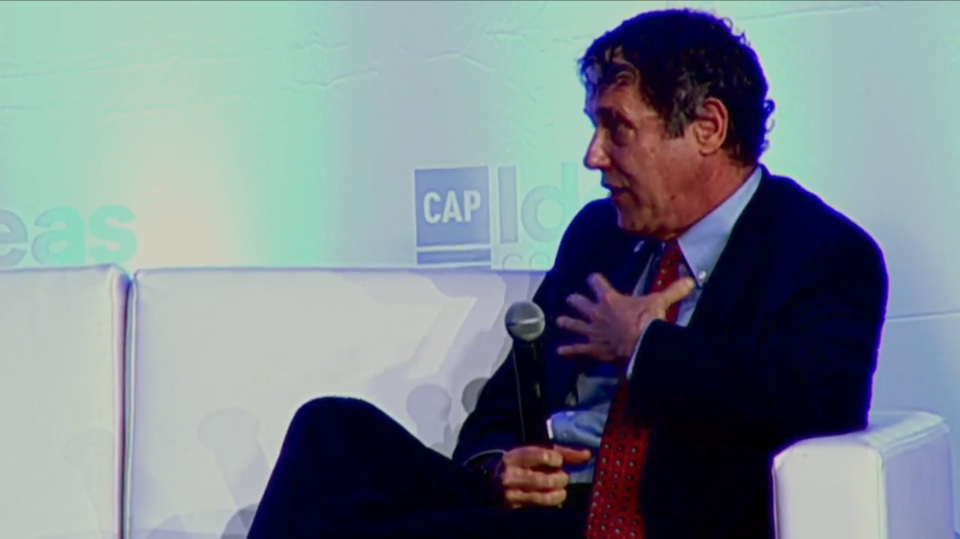Sherrod Brown lays out an agenda for 'the little guy' at conference of progressives

WASHINGTON — “Are you on the side of Wall Street or are you fighting for the little guy?”
That was the question posed by Sen. Sherrod Brown, Democrat of Ohio, at the opening of the 2018 Ideas Conference, an annual gathering of liberals hosted by the Center for American Progress. It was directed to the members of the Democratic establishment seated in the Washington, D.C., hotel ballroom finishing their breakfasts, and to the members of Congress who would take to the stage later that day — including those who, like Brown, are likely to enter the 2020 presidential race. The base was moving left, and so was the Democratic establishment, if somewhat more reluctantly. Brown’s question, then, was something more of a statement: You’re either with us or against us.
In a conversation with liberal New York Times columnist Paul Krugman, Brown outlined a Democratic agenda for the economy that suggests a dramatic leftward shift in the party’s platform since the insurgent presidential candidacy of Sen. Bernie Sanders, I-Vt., whose “democratic socialist” views were once thought toxic anywhere outside Berkeley or Brooklyn. Now, Sanders’s core proposals — free public college, universal health care, a $15 minimum wage — are increasingly becoming the central tenets of the Democratic Party.
Brown made the case that the economy will be the central issue in the coming election, above anti-Trump sentiment and social issues like gun control and abortion. “If we’re going to be a progressive movement and it’s about civil rights and human rights, it’s also about worker rights and it’s also about trade unions,” he said, adding a little later, “I don’t talk about Clinton voters or Trump voters. I don’t talk about white workers and black workers and Latino workers. I talk about workers and I talk about voters.”

And while the Democrats may not usher in the Scandinavian-style social democracy some on the left long for, the ideas discussed (and celebrated) at the conference would return to the federal government the muscular role it enjoyed during the Great Depression and the presidency of Franklin D. Roosevelt. Brown and Krugman repeatedly referenced, in particular, more powerful labor unions, higher wages and expanded social benefits.
These ideas are not likely to become reality during the Trump presidency. Republicans would counter that economic growth make them unnecessary in light of the falling unemployment rate — now at 3.9 percent — and gains in the stock market. But Krugman and Brown maintain that these macroeconomic gains obscure a more grim reality, in particular for Americans who have seen their wages stagnate in the face of record corporate profits and executive pay increases. Brown referenced recent layoffs at health care company Humana Inc., which affected hundreds. At the same time, chief executive Bruce D. Broussard had his pay doubled to nearly $20 million.
“We have a government that’s hostile to the middle class,” Brown said, mentioning last year’s tax cut and reform plan, which critics say was skewed heavily toward corporations and wealthy individuals. Krugman mused that benefits of the Trump tax cuts could eventually accrue for middle-class Americans, but only over decades. It was, he acidly concluded, an “extraordinarily bad tax plan.” Even so, tax cuts remain an article of faith for the right — except for a few, like former Ronald Reagan adviser Bruce Bartlett, a onetime proponent, who has concluded that trickle-down economics do not work.
“That’s the movie they run over and over,” Brown lamented. Meanwhile, moderator Neera Tanden, president of the Center for American Progress, noted how little had come of the $1 trillion infrastructure plan Trump had proposed during the presidential campaign. Sanders and other prominent Democrats in the Senate have recently proposed a federal job guarantee, predicated in part on a massive infrastructure investment.

This being an ideas conference, ideas were not in short supply. “There’s absolutely no reason not to be providing a floor, a social safety net,” Krugman said. Even as the party remains in thrall to big-ticket donors (the panel was introduced by technology investor Glenn H. Hutchins, a CAP board member), its leaders are embracing ideas that, only a decade ago, were relegated to earnest Nation magazine editorials.
But ideas dwell in the realm of the abstract, while politics are consigned to a decidedly more mundane realm. “We gotta win elections,” Brown reminded the audience, “to do all these things.”
Read more from Yahoo News:


